The slow and painful death of Coonana Homelands community in the WA Goldfields
In the 1950s the Spinifex people living in the Maralinga region in the Great Victoria Desert were dispossessed from their homelands to allow for atomic testing to be carried out by governments of the United Kingdom and Australia. The people were placed at Cundalee and then later moved onto Coonana because of water issues. Coonana lies approximately 170km east of Kalgoorlie-Boulder along the Trans Access Road, Once a busy community, but following the government bleeding the community of vital resources (including water) it was closed down.
Coonana community, 170km from Kalgoorlie-Boulder was once a busy community but now there's just one person left who has no water or services. In this is an example the government starved the community of services until it became unlivable.
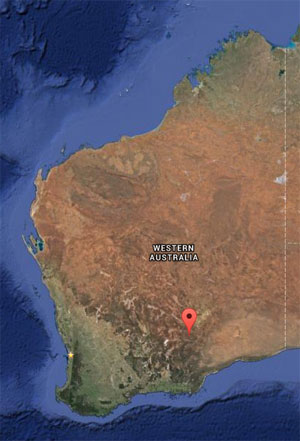
Coonana, Goldfields, WA
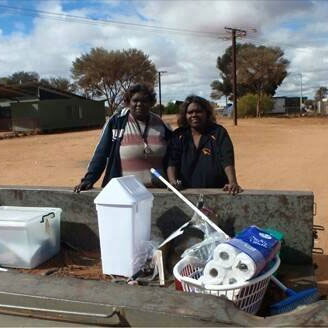
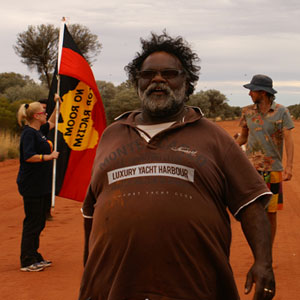
Indigenous pastor, Geoffrey Stokes
In the 1950s the Spinifex people living at Maralinga in the Great Victoria Desert were dispossessed from their homelands to allow for atomic testing carried out by the governments of the United Kingdom and Australia.
The people were placed at Cundalee but when there were issues with water the Coonana community was set up in the mid 1980s to accommodate these people.
Coonana lies approximately 170km east of Kalgoorlie-Boulder along the Trans Access Road, once a busy community it is now all but deserted.
Geoffrey Stokes is an Indigenous pastor and has grave concerns for the people that used to call Coonana home.
He blames the government for what's happened in the community, saying they want to commence mining in the area.
"When I first went out there, there were over 300 people, then in the last few years that I've been going out there, there would have been about 120, they don't exist anymore.
"I think they've been moved out quietly and quickly, the Government has come in and taken over.
"The funds for the shop stopped, the water and electricity and the other thing they took out was the health services, and that's the most important service that they had out there."
The mining companies and government propaganda
'Paedophilia', 'suicides' and 'social problems are such easy labels for the governments and the media to spin because they know the wider Australian population are racists and believe themselves to be superior to Aboriginal people ... and here it goes again, this time the excuse for closing a community is 'Social problems' ...
The Minister for Mining and Housing Bill Marmion was contacted for a response to Mr Stoke's comments. He declined to comment but issued the following comments in a statement:
'The suggestion the government let the community run down because it wanted the land back or to make it available for mining prospects is simply untrue.
The town had large social problems and gradually became depopulated as a result. The assets, houses, do not belong to the department... It should be noted that the Department of Housing's role in the town was to undertake limited maintenance to housing that was already in a limited state of disrepair when it came on board in 2009. It should also be noted that the antisocial behaviours of the residents and visitors at Coonana impacted significantly and detrimentally on the housing stock.'
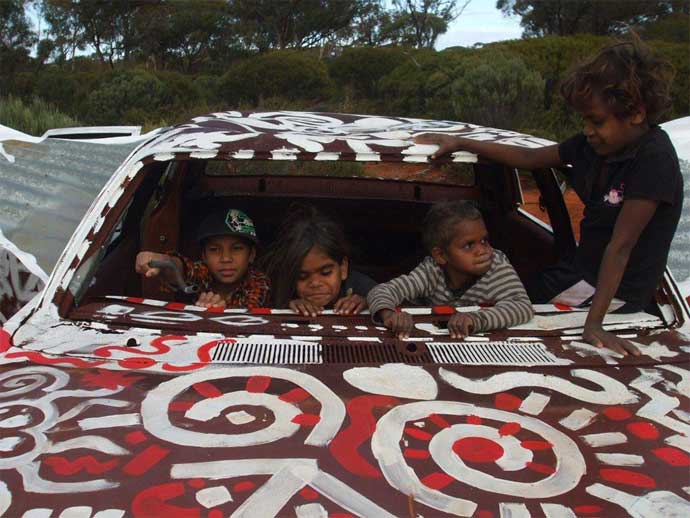
The Coonana Flying Car film resulted from a wonderful collaboration between filmmaker Peter Keelan, school staff at Coonana School, the community and the wonderful students. The Western Desert Kidney Health Project facilitated and supported this residency. WATCH THE VIDEO 'Coonana Flying' in HD
Former Coonana residents
Christopher Baker called Coonana home for close to two decades and wishes the community was as it once was.
His family and friends from the community are now split between Kalgoorlie-Boulder and Tjuntjuntjara.
He believes the problems at the community would be solved if all the parties involved could work together.
"It was good before, but not now, it's all gone down because of the funding not coming in.
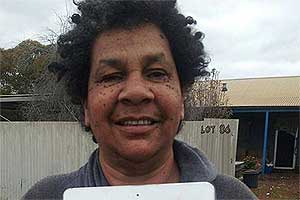
Annette Paul, the last Coonana survivor
We are raising funds for Annette Paul, the only surviving member of the Coonana community which was shamefully defunded and suppressed by the Barnett government.
Annette Survives on a pension and her power supply is limited to a small generator, her sister also on a pension carts in bottles of water, food and medical supplies in a car not suitable for gravel unsealed roads.
The funds raised will go towards buying a small rain water tank and a reliable vehicle.
"Not enough power, the councils and all that not working together, I would like to see people more back to Coonana.
"(My family) they moved back to Tjuntjuntjara or Kalgoorlie, I'm here for dialysis."
Victor Willis has a similar story to Christopher but says that social issues played a big part in the community's downfall.
"I used to live in Cundalee then we moved to Coonana, it was good back in that time, everything was running smooth.
"A lot of staff (were) still working, we had a clinic running there.
"But we had problems there, since the white staff moved on, that's when the problems start.
"I lived there for many years... (People began to) steal money, steal money from the shop and since then that's why the government can't fund the place."
Where the people went: Tjuntjuntjara
Many of the people who have moved on from Coonana chose to go to Tjuntjuntjara.
Fiona Pemberton is the general manager of the Tjuntjuntjara community.
She said the influx has put pressure on the already severe housing crisis.
"We've had a lot of discussions out here about the demise of Coonana, people were certainly very concerned about the prospect of Coonana closing and it's because people have a very strong connect to Coonana, a lot of babies have been born in the last 30 years and have grown up there, there is a cemetery there so there's a number of people buried there.
"People have enormous concerns about what will happen to the cemetery and who will look after it and how it will be protected.
"Coonana has memories and stories."
A statement from the Housing Department said that the supply of portable water in Tjuntjuntjara is insufficient to support additional housing at this time.
A very interesting statement from the Housing Department considering they were moved from their previous displaced community site that didn't have enough water.
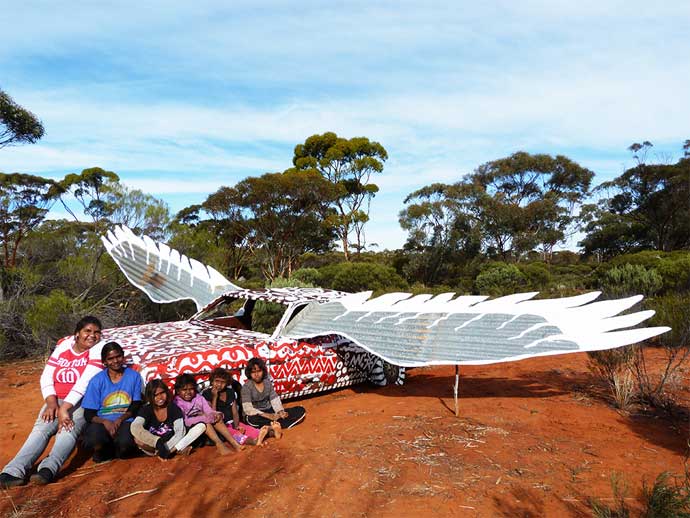
The car is an essential part of life for the people of the Western Desert. This sculpture saw the community of Coonana work with with film maker and visual artist Peter Keelan transform a wreck into a flying machine and symbolised the changes we can make to our bodies.
Aboriginal Lands Trust
The Coonana community lies on land in the care of the Aboriginal Lands Trust. ALT chair Clinton Wolf said a number of towns and places in regional WA become abandoned when people move on.
"Effectively, you can't keep throwing a massive amount of resources out to a community where I believe there is only one dwelling that is occupied now, there are some people who travel through there from time to time but it's a matter of saying 'where's the need?'... it's about prioritising and working out what fits best."
The Aboriginal Lands Trust statement beggars belief - the government forces people off their community by withdrawing vital services and then blame them for their own dispossession. There would have been no need for these people to live in any of these foreign community sites if there had been no British Atomic testing near their original Homelands site.
Published by Sovereign Union on 20th March 2015
Updated on 3rd May, 2015
Article borrowed heavily on an article by Lorraine Horsley, ABC Goldfields

